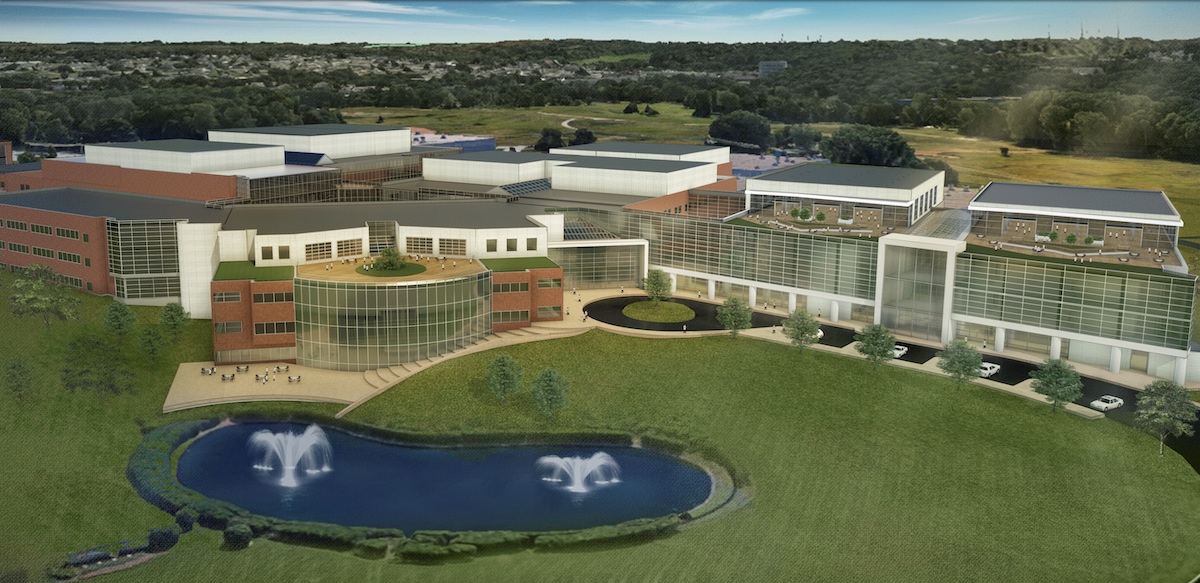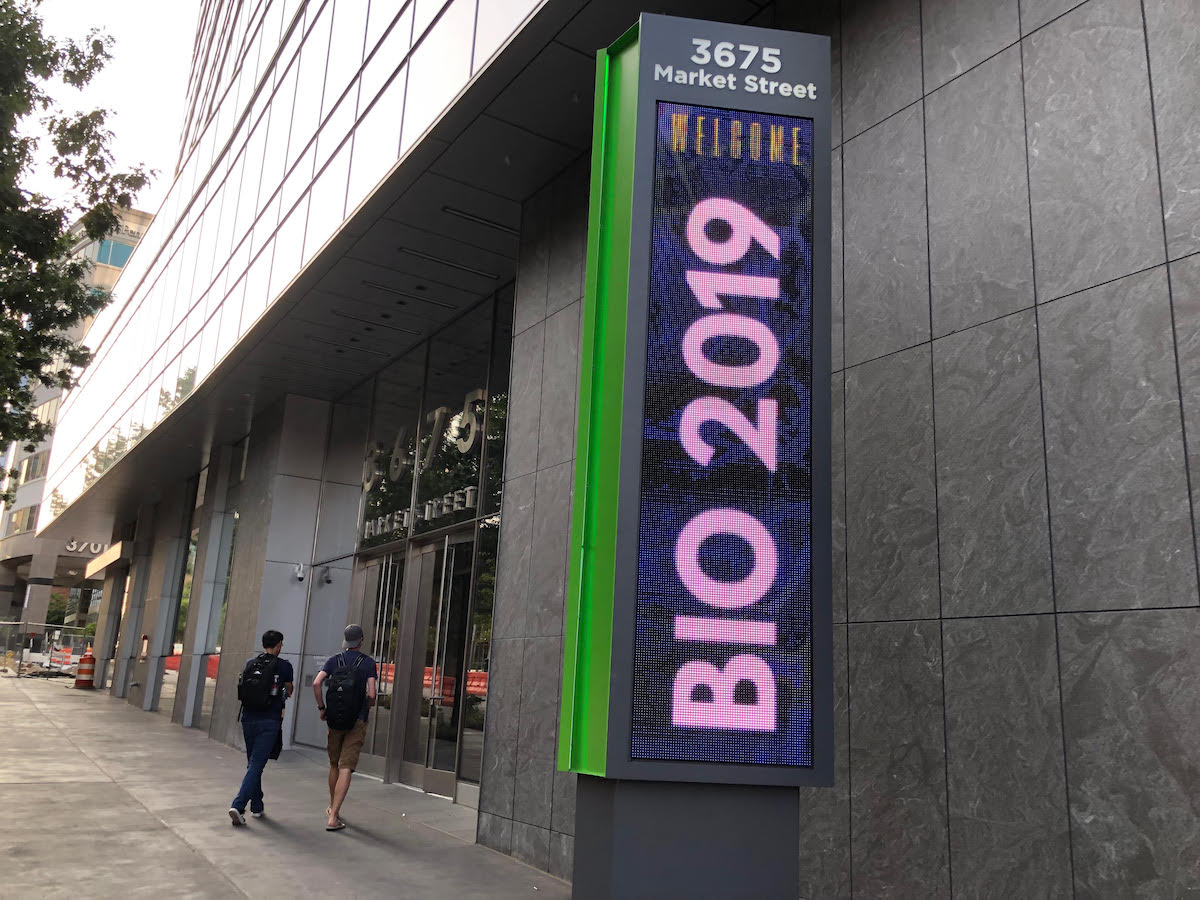Philadelphia is a hub for life sciences research. We know this.
For one, Philly ranks eighth among the country’s top life sciences clusters, with an industry of 51,000 people working on medical advances. And a quick rundown of recent local wins in this space:
- In February, Spark Therapeutics was acquired by Swiss pharma giant Roche for a cool $4.8 billion — confirmed in March as biggest-ever VC-backed exit in Philly.
- As of May, Chondrial Therapeutics has raised $25.8M for its Friedreich’s ataxia treatment.
- Last June, the University of Pennsylvania joined a $53 million funding round closed by University City’s Carisma Therapeutics, as part of a larger push to grow the local biotech sector.
- Plus, of course, the proliferation of eds and meds in the region.
Even so, “We think Philadelphia is an under-appreciated center for potential biotechnology innovation and commercialization,” says Spark cofounder and CEO Jeffrey Marrazzo in a video promoting this year’s BIO International Convention, happening this week through today at the Philadelphia Convention Center.
Later in the video, referencing the 2019 fest tagline “It Starts with One,” he says: “As a company, we took a philosophy that is very similar to the theme of this meeting, which is that it starts with one approval, it starts with one product that makes it to market.”
Presumably, he means to make a difference in the world, but it could also refer to how the world sees Philly: People are noticing us for the work we’re doing here. We’re on a roll.
BIO 2019, organized by the Biotechnology Innovation Organization and known as the world’s largest biotech industry convention, was expected to attract 17,000 attendees from something like 75 countries.
“The best way I can describe the exhibit hall is an industry-specific Epcot,” wrote University City Science Center Marketing Director Kristen Fitch in an email. “It’s impressive to see how regions, states and countries from around the world represent themselves through their displays, refreshments and obviously their technology. BIO is the convergence of the best and brightest in the life sciences.”
Accordingly, local biotech-focused organizations have been busy this week.
The Science Center, for instance, is a member of a regional stakeholder group “charged with ensuring that Philadelphia is showcased to its fullest potential while on a national stage at BIO and beyond,” Fitch said. That three-year, $1.65 million effort so far has manifested in a showcase during the convention of local speakers making the case for Philly as a biotech destination.
Also during the convention, the first cohort of companies in Global Startup Accelerator (backed by the Science Center and Welcoming Center for New Pennsylvanians) pitched at the European Commission Pavilion on Tuesday in the exhibit hall, and tonight’s Venture Café at 3675 Market’s Quorum space will feature a conversation with reps from the Japan External Trade Organization.
Several local innovation leaders have also taken the convention as an opportunity to announce big biotech development news.
3675 Market — the 14-story, multi-use innovation hub in University City housing the Science Center, coworking space CIC and wet lab operator BioLabs@CIC — has hosted a number of international delegations in the past few days, and on Tuesday evening BioLabs held a happy hour for visiting stakeholders.
Out-of-towner Nishta Rao, the managing director of BioLabs@NYU Langone, said at the gathering that she thinks of BIO as a reunion for the international biotech community.
“I think, more than anything else, it brings everybody under one roof [and is a chance to] see what everybody’s been up to,” she said. The science “changes so quickly, so you’re seeing innovation happening at a very rapid rate these days, and it’s very nice to be able to see that in one place.”
The Philly BioLabs, which opened this past December, is a model example of the organization’s goals, Rao said.
“It’s exactly what we’re trying to do with BioLabs, which is help entrepreneurs translate their technologies very quickly, very efficiently, into commercially viable products and therapies,” she said.
Beth Rowley, lab head at the Princeton Innovation Center BioLabs, commented on how much younger and urban this BioLabs seemed compared to Princeton’s.
“I didn’t realize how much development is going on all around here,” she said. “It’s going to be a huge change in this area in the next 10 years.”
###
Speaking of which: several local innovation leaders have also taken the convention as an opportunity to announce big biotech development news.
Near King of Prussia, The Discovery Labs is planning to open a whopping 1.6 million square feet of coworking space and collaborative labs for healthcare, life sciences and tech companies out of GlaxoSmithKline’s former Upper Merion/West Conshohocken campus. The cost: $500 million.
“The Discovery Labs is 20 times larger than the average coworking space, such as WeWork, and provides the mission critical infrastructure needed to operate healthcare, life sciences and technology-enabled companies,” said CFO Audrey Greenberg in a statement. “The size of each Discovery Labs enables enterprise level companies to work side by side with startup and emerging companies and enjoy the benefits of the coworking phenomenon.”
This location is the first of a “network of massive coworking properties” focused on collaboration around the world, per a press release. No planned opening date was included in the announcement.

On Monday, commercial real estate development firm University Place Associates (UPA) and cancer researcher The Wistar Institute announced their plans to build 240,000 square feet of biomedical research lab and office space at 4101 Market St., with a goal of opening in the first quarter of 2021.
“Our vibrant Philadelphia life sciences community is unparalleled in terms of the level of talent, collaboration and engagement shared among the many stakeholders throughout this region,” said Dr. Heather Steinman, Wistar’s VP for business development, in a statement. “Wistar is gratified to play a leadership role with UPA in advancing a vision of scientific leadership for the region and life science innovation globally.”
And a few days before the start of the convention, San Carlos, California-based Iovance Biotherapeutics announced that a 136,000-square-foot facility will be built in the Navy Yard for the commercial production of its cancer immunotherapy products. The 300 Rouse Blvd. construction is expected to be finished in 2021.
“Iovance’s decision to expand to Philadelphia is further evidence that our city’s reputation as a leading location for technology, innovation and life sciences is growing,” Mayor Jim Kenney said in a statement. “Companies from around the country and the world are seeing Philadelphia as the place they need to be in order to attract talent and grow their business.”
###
So, yeah, it’s been a big week for biotech in Philly. Here are some other big moments from the convention:
A biotech-inspired mural was unveiled last week at 1108 Sansom St.
Lauded Penn cancer researcher Dr. Carl June spoke about Philly’s prowess in the biotech space.
https://twitter.com/CEOCouncilPHL/status/1135647264616124417
Penn Center for Innovation Chief Marketing, Communications and Program Officer Laurie Actman judged young companies in the Startup Stadium.
And … this?
P.S. Yes, the phrase “Cellicon Valley” has been tossed around liberally this week. No, we don’t love it.







